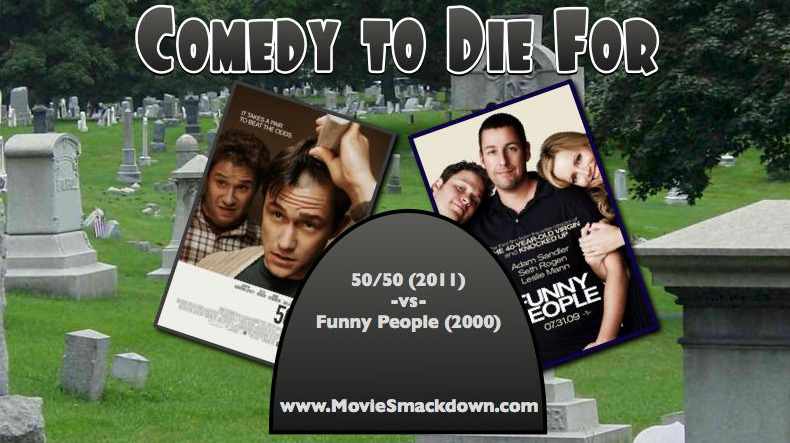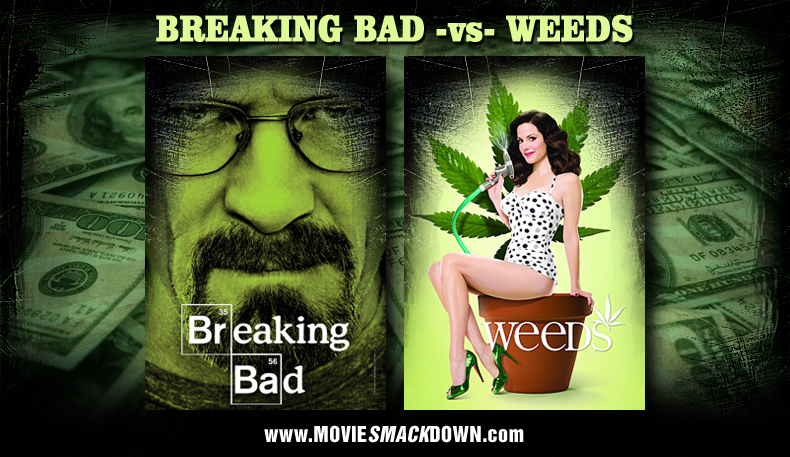
The Smackdown
Seth Rogen’s buddy is dying. Get ready to la-augh!
This is the hook for the new dramedy 50/50, but if it sounds familiar, it’s because you’re recalling Judd Apatow’s Funny People, with Adam Sandler (2009). If it doesn’t sound familiar, it’s because Funny People bombed once word got out that a) it was not the riotous barrel of hilarity that fans had come to expect from Apatow and Rogen’s previous collaborations (The 40-Year-Old Virgin, Knocked Up), and b) the film was two-and-a-half hours long and crammed with subplots. Fans of Sandler’s usual juvenilia were similarly caught off guard, by both the darkness of the subject matter and the fact that he was playing a bit of an asshole.
Does a similar fate await 50/50? Are dying dudes simply not the source of laughs they used to be in films like Burt Reynolds’ classic, The End? Are people just plain sick of the ubiquitous Rogen, who, after the under-performing Green Hornet, Observe and Report and even the seemingly foolproof Kung Fu Panda 2, is on a pretty iffy streak? And more importantly, if these movies were capable of fighting each other, which would come out on top? Time for a special, Fatal Illness Buddy Comedy Smackdown!
[singlepic id=1244 w=320 h=240 float=right]
The Challenger
50/50 was directed by Jonathan Levine, who previously made the rather lousy indie comedy The Wackness (2008), and it was written by Will Reiser, who based it on his own experience being diagnosed with a rare form of cancer at age 24, which (SPOILER ALERT) he survived. This makes him far more resilient than his cousin Paul’s last sitcom, which suffered from a rare and often fatal form of unfunniness. But I digress.
Playing Adam, a radio writer/producer who is informed of a malignant tumor in his spine, is child sitcom star-turned-indie-everyman Joseph Gordon-Levitt. He takes the news with relative calm, and his hedonistic best friend (Rogen), while distraught at first, takes it even better, quickly realizing how to play up the sympathy angle to score dates for both of them. This is the source of most of the film’s comedy, but it’s a relatively small slice of the pie.
Other slices, which are mostly not going for laughs, include Angelica Huston as the worrywart mom, Bryce Dallas Howard as the unreliable girlfriend, the great Philip Baker Hall and Matt Frewer as fatherly fellow chemo patients (Adam’s actual father is suffering from Alzheimer’s and is pretty much superfluous), and Anna Kendrick, as a sweet but inexperienced therapist-in-training, basically recycling her character arc, awkward mannerisms and distracting toothiness from Up in the Air.
All of this adds up to a somewhat rambling but oddly affecting film, which in its refreshingly low-key and believable style, is certainly capable of drawing (and not jerking) tears, but many of them will probably be more in response to the tangential thoughts it inspires than the film itself. Then again, one could argue that a good cry is a good cry, so if that’s your thing, have at it.
[singlepic id=670 w=320 h=240 float=right]
The Defending Champion
Funny People was, among other things, former comedian Judd Apatow’s love letter to his colleagues and to the world in which he matured into one of the smartest and most successful comedy writers in the business. It’s also got two parallel buddy relationships and two love triangles. In fact, it’s got enough story for at least three movies. Apatow is not the most disciplined of filmmakers, giving his actors a lot of room for improv and often prioritizing their noodling over telling a coherent story, and this time, audiences simply didn’t have the patience for it, which is a shame, because it’s genuinely one of the most unusual, risk-taking mainstream releases of the last several years.
Sandler stars as George Simmons but is essentially playing himself, a comedian who’s made it big by starring in idiotic comedies. After being diagnosed with leukemia and given a very slim chance of survival, he responds by returning to his stand-up roots, hiring Ira (Rogen), a young but raw comic talent, as his assistant and co-writer, and resuming pursuit of the one great love of his life (Apatow’s wife and cast regular, Leslie Mann), now married with children. Rogen, meanwhile, on top of trying to cater to the whims of his temperamental new friend and employer and cope with the news of his illness, is dealing with the bitter jealousy of one roommate (the equally ubiquitous Jonah Hill), and his own painful jealousy of another (Jason Schwartzman, whose usual insufferability is actually appropriate here), who is the star of a hilariously awful, Head of the Class-like sitcom that enables him to effortlessly steal the affections of a fellow comedienne Ira likes, played by the engagingly quirky Aubrey Plaza (Parks and Recreation).
So yeah, it’s one busy movie, but it breezes along quite enjoyably for quite a while, thanks to terrific performances, numerous fun cameos by comedians and others playing themselves, and lots of good stand-up scenes (Sandler and Rogen’s extensive experience as comedians comes in handy here). If nothing else, it’s the best movie about comedians ever made, which admittedly isn’t saying much (Punchline, anyone?). Where it falters for most people, however, is when Sandler heads out to Mann’s suburban home (with, for some reason, Rogen in tow) in hopes of stealing her away from her Aussie husband, exuberantly played by Eric Bana (a former comedian himself). It’s a long sequence that feels so isolated, in both plot and tone, from the rest of the film that by the time Rogen is begging to leave, most of the audience is right there with him.
The Scorecard
Of the two, 50/50 is the one you can take your mom to. It’s not really about getting laughs, and its few comic moments are hardly subversive. Rogen is, as always, so cheerfully frank about his shallow, sex-crazed thought process that he makes shameless hedonism positively endearing, and all his scenes with Gordon-Levitt have the loose, improvisatory crackle we’ve come to expect from him and his Apatovian colleagues. So yes, there are laughs when the two hit the singles bars and try out “I have cancer†as a come-on, but most of the film is warm and fuzzy and decidedly not the dark comedy it’s being advertised as.
Joseph Gordon-Levitt is an actor who is capable of pretty much anything (check out Mysterious Skin, The Lookout and Brick), which is why it’s disappointing to see him playing the standard Nice Guy. This script, particularly toward the end, gives him a bit more range than the smug, mushy, wildly overrated 500 Days of Summer. It’s a perfectly affable performance, but like the movie around him, you’re left wishing it had more edge to it.
Funny People, on the other hand, is just about the last movie you’d take your mom to, unless your mom really, really enjoys dick jokes. It’s joyously profane, as a movie about comedians should be. Its unconventional length and structure, odd shifts and tone, and frequently repellent protagonist make it seem almost determined to be audience-unfriendly. Apatow doesn’t seem the slightest bit interested in trying to please the masses or anyone else… which is largely what I like about it. It’s a crazy, overstuffed mess, but it clearly comes from the heart and makes no compromises. It will probably never be as widely beloved as Apatow’s first two blockbusters, but for my money, it’s the most mature, personal and even bold work of the three. If a Funny People cult develops over the next few years, don’t say I didn’t warn you.
The Decision
Two such similar-sounding films on the surface, but so different in execution. Even their connecting link of Rogen as the buddy is nearly opposite between the two: In Funny People, he’s the level-headed, good-hearted one who brings out the best in his repellent friend, while in 50/50, he’s the Falstaffian devil in his buddy’s ear. 50/50 is almost an hour shorter than Funny People, which, for some, ends the competition right there. It evokes a few scattered laughs but potentially a flood of tears, depending on how personal the subject is for you. Funny People, on the other hand, has several big laughs, no tears and long stretches of neither. The protagonist of 50/50 is a lovable sweetie from beginning to end, while the one in Funny People is a quick-witted charmer but also a raging, bullying narcissist for most of the way. 50/50 goes down easy like a gentle white wine. Funny People is more of a bizarre cocktail of about five whiskeys, adding up to an uncategorizable blend that some will savor and others will spit out, not knowing what to make of it.
As Full Metal Jacket’s Sergeant Hartman said of Private Joker when promoting him to squad leader: “He’s silly and he’s ignorant, but he’s got guts. And guts is enough.†Such is the case with our winner, Funny People.





Funny People had more focus on the George Simmons character than it did on whther or not he survived his illness. It seems that 50/50 is going to cone down to whether or not he survives at the end but I am just guessing. It would make it more difficult to compare if 50/50 does put more focus on whether its main focus is on “will Adam survive or not?”
Great Review! One risk Apatow decided NOT to take is having the montage of Sandler’s cancer treatment underscored by Sandler doing stand-up instead of the music that ended up in the final cut. I agree that Funny People is a great film, disagree on The Wackness.
Great review…and I agree with you about Funny People…happy to help start the cult. When’s the first meeting?
Art… that is a terrifically intelligent review, and funny, too! I’ve always had a soft spot for films about cancer patients who have Seth Rogen as their wing man which, admittedly, is a niche. I’m off to see 50/50 tomorrow. I give it half a chance of being as amusing as Funny People, which I liked a whole lot.